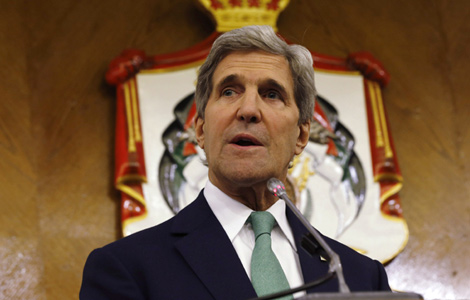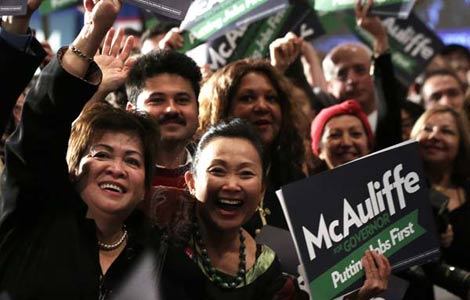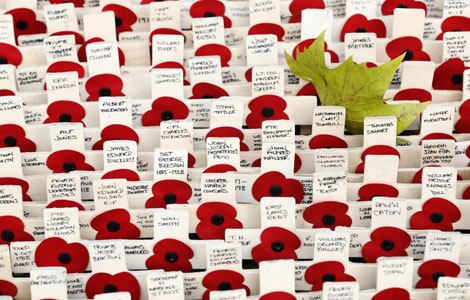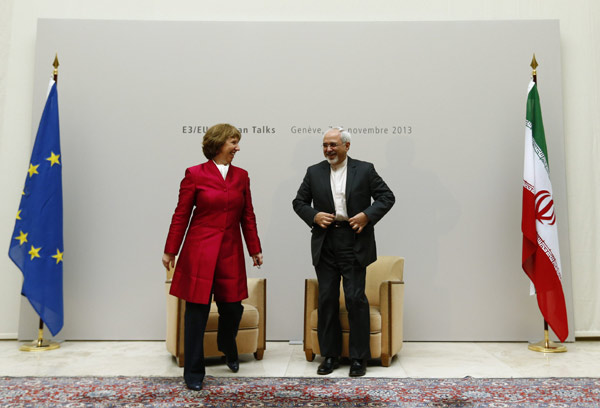Kerry to join Iran nuclear talks in bid to reach deal
Updated: 2013-11-08 09:28
(Agencies)
|
||||||||
US SENATE MAY SEEK MORE SANCTIONS
Lending urgency to the need for a breakthrough soon, a US Senate committee said it would pursue a package of tough new sanctions on Iran after the current Geneva talks end on Friday.
President Barack Obama has been pushing Congress to hold off on more sanctions against Iran, demanded by its arch-enemy Israel, to avoid undermining the diplomacy aimed at defusing fears of an Iranian advance towards nuclear arms capability.
Ashton's spokesman said on Thursday evening that the powers and Iran were "making progress" towards easing the standoff.
Michael Mann said Ashton would meet Iran's foreign minister and chief negotiator, Mohammad Javad Zarif, on Friday morning "to allow more time to work through some issues".
Zarif said earlier in the day: "I'm hopeful that we can move forward. We are making progress, but it's tough."
In an interview with CNN later, Zarif suggested that a partial suspension of Iran's contested uranium enrichment campaign might be possible - a concession it ruled out before moderate Rouhani's landslide election.
"There won't be a suspension of our enrichment programme in its entirety," Zarif said, rejecting Israel's central demand.
But he said he hoped the sides would agree a joint statement on Friday stipulating a goal to be reached "within a limited period of time, hopefully in less than a year", and a series of reciprocal actions they would take "to build confidence and address their most immediate concerns".
Iran says it is enriching uranium only to fuel future nuclear power stations and for medical purposes. But its refusal to halt activity which can also have military applications has drawn the increasingly tough sanctions.
The United States said it also held "substantive and serious" bilateral talks with Iran in Geneva - direct dialogue inconceivable before Rouhani took office pledging to build bridges abroad and end a slide towards conflict with the West.
Iran and the United States have had no diplomatic ties since soon after the 1979 Islamic Revolution that overthrew the US-backed monarchy, and their mutual mistrust and enmity has posed the biggest obstacle to any breakthrough nuclear accord.
White House spokesman Jay Carney said that in exchange for "concrete, verifiable measures" of restraint by Iran, the six powers "would consider limited, targeted, and reversible relief that does not affect our core sanctions architecture".
The broader sanctions regime would stay pending a "final, comprehensive, verifiable" accord, Carney told reporters in Washington. If Iran did not follow through towards this end, modest sanctions relief could be reversed and stiffer penalties imposed.

 Super typhoon Haiyan slams into Philippines, at least 3 dead
Super typhoon Haiyan slams into Philippines, at least 3 dead
 50 arrested at LA protest over Wal-Mart wages
50 arrested at LA protest over Wal-Mart wages
 Kerry to join Iran nuclear talks in bid to reach deal
Kerry to join Iran nuclear talks in bid to reach deal
 Politicians court US-Asians amid anti-China sentiment
Politicians court US-Asians amid anti-China sentiment
 Britain remembers war dead
Britain remembers war dead
 Stolen newborn returned to family
Stolen newborn returned to family
 TCM firms should 'learn rules of West'
TCM firms should 'learn rules of West'
 Artists see big picture in CBD's art zone
Artists see big picture in CBD's art zone
Most Viewed
Editor's Picks

|

|

|

|

|

|
Today's Top News
Kerry says aims to close 'important gaps' in Iran nuclear tal
Kerry to join Iran nuclear talks in bid to reach deal
Lenovo profit surges on smartphone, tablet sales
Houston and Shenzhen step up business
Bank exec describes meeting with Li Keqiang
CCBOT finds platform to tackle US market
BlackBerry could pay $250m break fee
China should allow for higher inflation: economist
US Weekly

|

|








